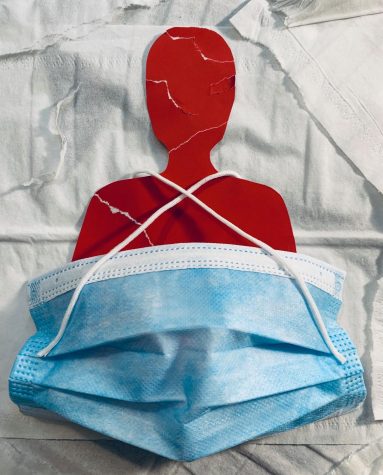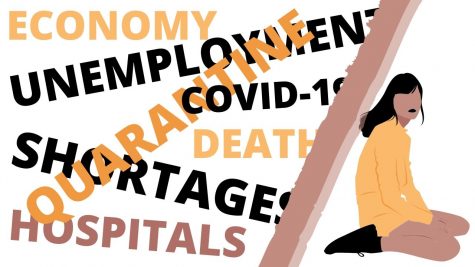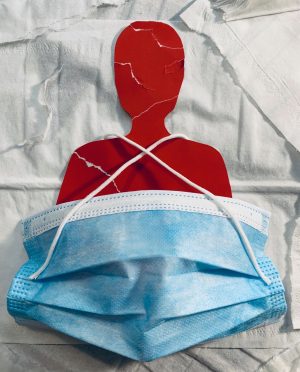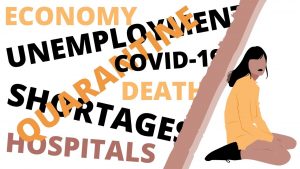The mask shaming game is not worth it
Why resorting to debasing others won’t actually help with the pandemic
September 13, 2020
Seeing someone out in public without a mask was meaningless at the beginning of 2020. In fact, for many people who are tied to Asian cultures in the U.S. and in Asian countries, wearing a mask as a safety precaution is only one of the many reasons why they choose to wear one in the first place. However, with the number of COVID-19 cases reaching well beyond six million since the virus was introduced in the U.S., many more Americans have adopted mask-wearing, and this has been normalized just like in other countries.
While masks have been proven to be effective for preventing pre-symptomatic and asymptomatic related infections through research and real-life scenarios, a handful of Americans still choose to go out in public without one. Earlier this year when COVID-19 first entered America, many health experts, such as the Centers for Disease Control and Prevention (CDC), advised Americans to only wear a mask when sick or caring for a loved one who is infected. In addition, medical workers were met with a shortage of masks, among other PPE supplies, after Americans began buying them in bulk. But, even after the CDC retracted this statement and urged the general public to wear masks, this safety precaution is still sometimes met with hesitation and even backlash.
Numerous anti-mask protests and rallies have taken place over the course of these past few months. A majority of the individuals who support the anti-mask movement seem to do it for the rush of going against authorities, the uncomfortable feeling of covering one’s face or the sentiment that wearing a mask infringes upon constitutional rights. But the number of positive COVID-19 cases in America could’ve been easily reduced if we all chose to wear masks diligently throughout this pandemic, among other actions such as making free testing widely available early on or keeping businesses closed for longer which was successful in South Korea, which flattened their curve in April.
Anti-mask activists in Florida took their campaign over the weekend to a grilled cheese bar whose owner said she would not require customers to wear masks, even as the state reported more than 15,000 new cases in just 24 hours on Sunday https://t.co/Ma408N6K7T pic.twitter.com/fsUKNShj9R
— Reuters (@Reuters) July 12, 2020
Masks have also been greatly politicized, especially because during the earlier months of this virus, President Trump said to millions of Americans that mask-wearing is only “voluntary,” and ridiculed a reporter who refused to take off his mask during a press conference, saying the reporter just wants to be “politically correct.” Though Trump finally went out in public with a mask for the first time on July 11, and advised mask-wearing in late July, the idea of protecting ourselves should have either been encouraged in politics since the beginning or not politicized at all.
Additionally, some Americans believe that mandated regulations for masks violate liberty, but laws and protocols about masks are not only advised by scientists and experts, but also enacted for our own well-being, not to strip us of any rights. Since the science of mask-wearing is basically common sense to the majority of Americans who do support this, seeing someone without a mask, or a group of people willing to resist this precaution passively, can seem irrational and senseless. However, no matter how unbelievable it is seeing our own peers go out without a mask, we must approach them with patience and empathy.
Social distancing can be lonely. Interacting with our friends and family through a screen every day can be exhausting. And yes, masks aren’t always the most comfortable. These thoughts are universal — it just so happens that for some, they are amplified to an extent where they decide to value their own needs over their community’s needs, and may not realize the full consequences of not wearing a mask. The thought of going out just once, not social distancing or wearing a mask after months of being cooped up may not seem significant in the moment. But it’s a risk that should not be taken, as proved by scientists and experts.
At the end of the day, lives matter more than taking a photo without the presence of a mask. Lives matter more than the short period of discomfort from wearing a mask. But we have to see both sides of this — it’s hard staying home for this long or lacking the social interactions we’d normally have without a screen or mask, but these steps are necessary. So when we encourage others to start wearing masks, our approach should be in a collected manner.
In the future, when we see someone out in public without a mask, or our friends posting on social media with a group and no masks present, we need to reach out to them with facts, statistics and respect — rashness and name-calling are unnecessary and counterproductive. It’s understandable that hearing leaders and authority provide contradicting information about the effectiveness of masks can be confusing, so we have to work towards educating others.
Inform others on how their seemingly minuscule actions play a role in the racial disparities among COVID infections. Provide them with information about how wearing a mask can reduce the chance of infection by 65%. Remind them that someone who is asymptomatic can still transmit infection. Appeal to their emotional instincts, such as protecting their loved ones. Send them well-researched and informational social media posts.
These discussions don’t have to sound condescending or villainizing. At the end of the day, we can’t force anyone to wear a mask, but we can encourage them to use more effective methods to prevent additional transmission. A lot about this pandemic is out of our control, but as cheesy as it may sound, a collective effort will certainly make the situation more bearable.




















